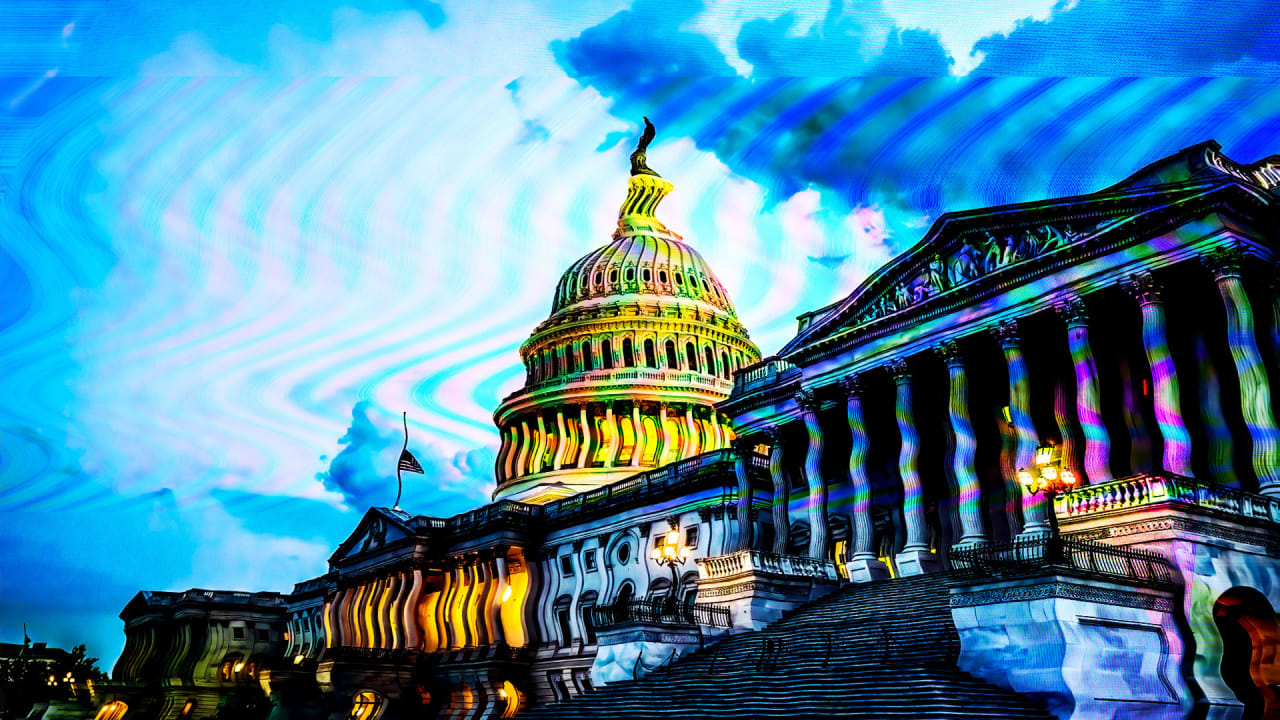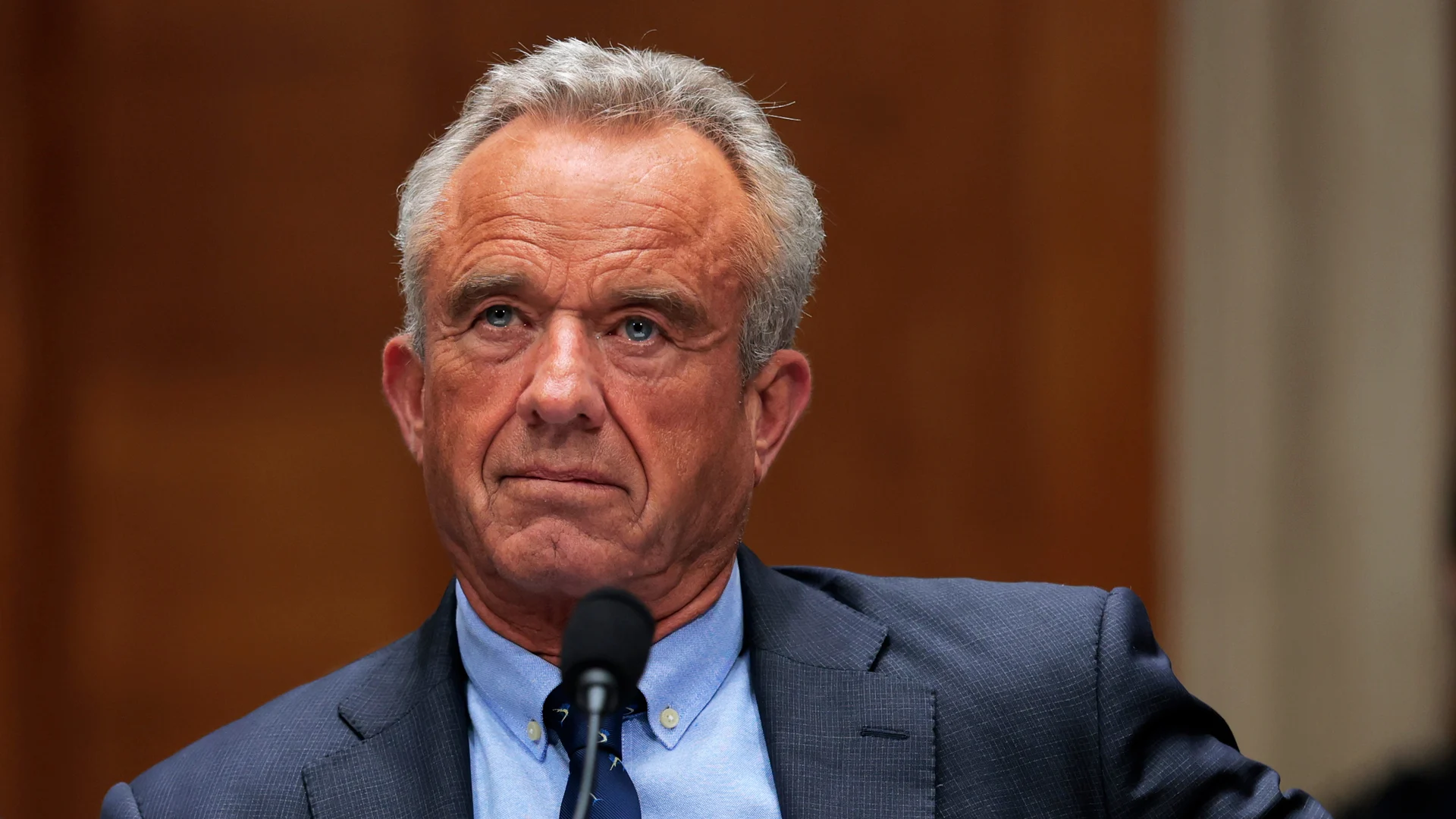Trump’s ‘big, beautiful bill’ could sideline state AI protections for a decade
A few lines of text in a sweeping new bill moving through Congress could have major implications for the next decade of artificial intelligence. Trump is pushing Republicans in Congress to pass “one, big beautiful bill,” which hinges on deep cuts to popular federal assistance programs like Medicaid and SNAP to drum up hundreds of billions of dollars for tax cuts and defense spending. Among the bill’s other controversies, it could stop states from enforcing any laws that regulate AI for the next 10 years. “No state . . . may enforce any law or regulation regulating artificial intelligence models, artificial intelligence systems, or automated decision systems during the 10-year period beginning on the date of the enactment of this Act,” the bill stipulates. The proposal to hamstring states’ regulatory power popped up in the House Energy and Commerce Committee’s portion of the massive budget reconciliation mega-bill. The reason? House Republicans on the committee want to allocate $500 million to modernize federal IT tech, including through the deployment of “state-of-the-art” commercial AI—but they’re worried about regulators getting in the way of federal AI adoption. In order to “streamline” the federal government’s ability to readily adopt AI into its systems, the bill sidelines one potential check on its power: the states. States are effective tech regulators—unlike the federal government The bill’s language is broad, protecting AI models and systems through a moratorium on state-level legal challenges, but also including any “automated decision system”—a catchall category the legislation defines as any computational process “that issues a simplified output” and replaces human decision-making. That expansive description means the moratorium could prevent states from regulating all kinds of everyday automated processes and algorithms that wouldn’t fall under a narrower definition of artificial intelligence. As Trump’s political opponents raise alarm over the broader reconciliation bill’s proposed cuts to Medicaid, some House Democrats slammed the overlooked AI provision as a “giant gift” to Big Tech companies. “This ban will allow AI companies to ignore consumer privacy protections, let deepfakes spread, and allow companies to profile and deceive consumers using AI,” Rep. Jan Schakowsky (D-IL) said. A moratorium on state-level AI regulation might not sound like a huge deal, but states are often the only check on the tech industry’s power over consumers. From social media algorithms to AI, the federal government has largely failed to regulate emerging technology over the last decade. States have picked up the slack, with powerful laws like the Biometric Information Privacy Act (BIPA) in Illinois ensnaring Meta over the company’s mishandling of facial recognition data. States have already stepped in to regulate AI. Last year, Tennessee became the first state to protect musicians from AI systems that would copy their voice without permission. In Colorado, a new law designed to protect residents from discrimination within systems relying on AI just survived a challenge from opponents. Budget reconciliation offers a fast track for some bills Beyond the small provision on AI, the budget reconciliation bill would deliver on a number of the president’s signature priorities, like funding ongoing construction of the border wall between the U.S. and Mexico and extending tax cuts from Trump’s first term beyond 2025. In its first 100 days, the Trump administration leaned heavily on executive orders and other unilateral actions that didn’t require cooperation from Congress. With Trump’s early blitz of executive actions—including sharp limits to immigration and deep cuts to the federal workforce—now tangled up in court challenges, the administration has turned to Republicans in Congress to enact other parts of his agenda. In Congress, a special process known as budget reconciliation allows some kinds of legislation to pass with a simple majority vote in the Senate, bypassing the need to whip up 60 votes to overcome a filibuster. For an administration with little interest in the slow, compromise-driven work necessary to craft bipartisan legislation, a budget reconciliation bill offers an alternative path, though one that only applies to some bills related to spending, taxes, and the debt limit. Will the bill pass? With the committee markup sessions wrapped up, House Republicans are aiming to push the mega-bill through its next phase of scrutiny on Friday. With such a large legislative package covering so much ground, disagreements on any one of its component parts could spell the bill’s demise. While the relatively tiny piece of significant AI deregulation within the bill is unlikely to be a sticking point, Senate Republicans have expressed concerns over the bill’s failure to reduce federal spending. President Trump is likely to dial up the pressure if the bill clears

A few lines of text in a sweeping new bill moving through Congress could have major implications for the next decade of artificial intelligence.
Trump is pushing Republicans in Congress to pass “one, big beautiful bill,” which hinges on deep cuts to popular federal assistance programs like Medicaid and SNAP to drum up hundreds of billions of dollars for tax cuts and defense spending. Among the bill’s other controversies, it could stop states from enforcing any laws that regulate AI for the next 10 years.
“No state . . . may enforce any law or regulation regulating artificial intelligence models, artificial intelligence systems, or automated decision systems during the 10-year period beginning on the date of the enactment of this Act,” the bill stipulates.
The proposal to hamstring states’ regulatory power popped up in the House Energy and Commerce Committee’s portion of the massive budget reconciliation mega-bill.
The reason? House Republicans on the committee want to allocate $500 million to modernize federal IT tech, including through the deployment of “state-of-the-art” commercial AI—but they’re worried about regulators getting in the way of federal AI adoption. In order to “streamline” the federal government’s ability to readily adopt AI into its systems, the bill sidelines one potential check on its power: the states.
States are effective tech regulators—unlike the federal government
The bill’s language is broad, protecting AI models and systems through a moratorium on state-level legal challenges, but also including any “automated decision system”—a catchall category the legislation defines as any computational process “that issues a simplified output” and replaces human decision-making.
That expansive description means the moratorium could prevent states from regulating all kinds of everyday automated processes and algorithms that wouldn’t fall under a narrower definition of artificial intelligence.
As Trump’s political opponents raise alarm over the broader reconciliation bill’s proposed cuts to Medicaid, some House Democrats slammed the overlooked AI provision as a “giant gift” to Big Tech companies. “This ban will allow AI companies to ignore consumer privacy protections, let deepfakes spread, and allow companies to profile and deceive consumers using AI,” Rep. Jan Schakowsky (D-IL) said.
A moratorium on state-level AI regulation might not sound like a huge deal, but states are often the only check on the tech industry’s power over consumers. From social media algorithms to AI, the federal government has largely failed to regulate emerging technology over the last decade. States have picked up the slack, with powerful laws like the Biometric Information Privacy Act (BIPA) in Illinois ensnaring Meta over the company’s mishandling of facial recognition data.
States have already stepped in to regulate AI. Last year, Tennessee became the first state to protect musicians from AI systems that would copy their voice without permission. In Colorado, a new law designed to protect residents from discrimination within systems relying on AI just survived a challenge from opponents.
Budget reconciliation offers a fast track for some bills
Beyond the small provision on AI, the budget reconciliation bill would deliver on a number of the president’s signature priorities, like funding ongoing construction of the border wall between the U.S. and Mexico and extending tax cuts from Trump’s first term beyond 2025.
In its first 100 days, the Trump administration leaned heavily on executive orders and other unilateral actions that didn’t require cooperation from Congress. With Trump’s early blitz of executive actions—including sharp limits to immigration and deep cuts to the federal workforce—now tangled up in court challenges, the administration has turned to Republicans in Congress to enact other parts of his agenda.
In Congress, a special process known as budget reconciliation allows some kinds of legislation to pass with a simple majority vote in the Senate, bypassing the need to whip up 60 votes to overcome a filibuster. For an administration with little interest in the slow, compromise-driven work necessary to craft bipartisan legislation, a budget reconciliation bill offers an alternative path, though one that only applies to some bills related to spending, taxes, and the debt limit.
Will the bill pass?
With the committee markup sessions wrapped up, House Republicans are aiming to push the mega-bill through its next phase of scrutiny on Friday. With such a large legislative package covering so much ground, disagreements on any one of its component parts could spell the bill’s demise.
While the relatively tiny piece of significant AI deregulation within the bill is unlikely to be a sticking point, Senate Republicans have expressed concerns over the bill’s failure to reduce federal spending. President Trump is likely to dial up the pressure if the bill clears the House, but there are signs that without major changes, the “big, beautiful bill” could sink before it leaves the harbor.




























































































































![Are AI Chatbots Replacing Search Engines? AI vs Google [New Research]](https://www.orbitmedia.com/wp-content/uploads/2025/05/How-often-are-we-using-AI-chatbots_.webp)

































